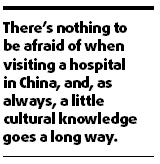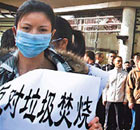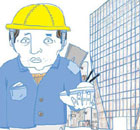Opinion
Demystifying medical practice in land of the dragon
By Eric Sommer (China Daily)
Updated: 2010-01-15 07:53
 |
Large Medium Small |
I experienced a minor medical miracle a few years ago when I was teaching at Beijing University of Traditional Chinese Medicine.
After sustaining a foot injury, I limped painfully across the campus with the help of two students to a clinic in a school of traditional Chinese medicine (TCM) staffed by former professors from the university.

"Your foot is not broken," the doctor said, "but the muscle is damaged and you need treatment." She proceeded to insert an acupuncture needle in my hand and another in my foot. After 30 minutes, she removed the needles and sent me home to rest.
The next morning I awoke, expecting to endure the pain in my foot for at least a week while the muscle healed. To my amazement, I felt only mild pain, and even that subsided after a minute or two - never to return.
Chinese medical practice holds surprises and can be somewhat baffling for newly arrived foreigners in China.
To begin with, Western and traditional Chinese medical doctors both practice traditional Chinese medicine.
Chinese medicine is based on the theory of energy pathways in the body, which have to be regulated by inserting acupuncture needles at key points in the body and using relatively mild TCMs when you are ill.
Western medicine, in contrast, is based on modern anatomical and physiological theories, and powerful and often synthetic drugs like antibiotics. Both kinds of treatments are available in Chinese hospitals, and even doctors who practice Western-style medicine routinely include TCMs in their prescriptions.
The availability of both kinds of treatment is a great advantage that Chinese medical practice has. The two approaches tend to complement each other.
New expatriates in China could also be confused because generally they have to visit hospitals to see a doctor, whereas in the West doctors often use a chamber in ordinary office buildings for practice. In other countries, you ask a person "Do you want to go to hospital?" only when he/she is seriously ill. But in China it just means that you need to see a doctor.
Another problem for foreigners visiting Chinese hospitals is the language barrier. Though every hospital has some doctors and nurses who speak at least rudimentary English, the non-bilingual foreigner is well advised to request a fully bilingual Chinese friend to accompany him or her for translation when going for treatment.
An important cultural difference from the Western perspective when visiting hospitals is the lack of privacy while consulting a doctor. Discussions of medical problems with doctors in the West, or for that matter many other countries, normally take place in private. Other medical personnel or family members may be included, though.
In contrast, discussions with doctors in Chinese hospitals take place with other patients in the room, who often stand only a foot or two away.
This can be quite disconcerting for non-Chinese people. But it is not because of lack of consideration. Instead, it results from a deeper cultural difference. The boundary separating public from private matters is narrower in China than in many other countries.
One of the biggest problems both for Chinese and foreign patients visiting hospitals in the Chinese mainland is the prescription of unnecessary drugs or tests.
Over-prescribing is, in fact, the number one complaint of Chinese people about the current medical system. And though the central government has duly noted this problem and is considering various reforms to change it, for now, taking along a savvy Chinese friend while visiting a hospital is one good way of preventing over-prescription.
If a prescribed drug is expensive, you may also want to ask the person manning the dispensary if there is an equivalent generic drug that is less expensive. Usually you need to go back to the doctor for a change of prescription.
The equipment and procedures in Chinese hospitals, at least in cities, however, are generally quite up-to-date, and medical personnel are quite competent. And unlike other countries where an appointment may be necessary before visiting a doctor, walk-ins are welcome.
There's nothing to be afraid of when visiting a hospital in China, and, as always, a little cultural knowledge goes a long way.
The author is a Canadian, teaching in China.













